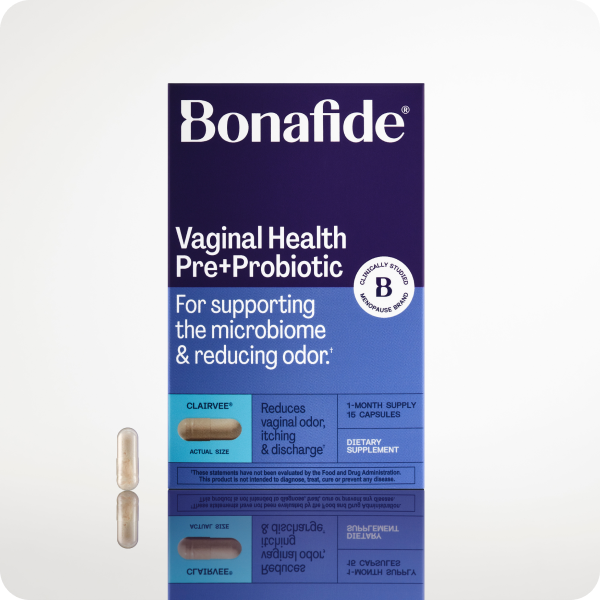You might be prepared for symptoms like hot flashes, night sweats, or vaginal dryness during menopause. But hormonal changes during menopause and the years leading up to it can set the stage for health issues that you might not have thought much about before.
“Changes to the body’s hormone system are echoed in the vagina and create an environment that can make women more at risk for certain health conditions.”
– Doctor Suzanne Hall, OBGYN
The good news, though, is that knowledge is power. When you understand your risk factors, there are steps you can take to promote your overall wellness and improve your health so you can feel your best. Here are four common health issues to know about during perimenopause, according to Dr. Hall, plus tips for managing them.
Urinary Tract Infections (UTIs)
Why they happen: Urinary tract infections are caused most-often when harmful bacteria typically found near the anus or the vagina spread into the urinary tract, initiating an infection. They can happen at any age, but can become more common during perimenopause and menopause. “Falling estrogen levels lead to thinner vaginal tissue,” explains Dr. Hall. “That allows for bacteria to enter the opening of the bladder more easily, which can increase the risk for a UTI.” Estrogen also plays a role in helping strains of good bacteria thrive in the vagina,1 according to Harvard Health experts. As estrogen levels fall, it can be harder for those good bacteria strains to keep urinary tract infection-causing bacteria, in check.
How to manage and treat urinary tract infections: The best preventive strategies for urinary tract infections are the simplest. Flush lingering bacteria out of your urinary tract by drinking plenty of water and emptying your bladder often – every two to three hours if possible – as well as after having sex. If you struggle with UTIs, ask your healthcare provider about taking cranberry extract supplements, Dr. Hall suggests. Cranberry extract contains compounds that can make it harder for bacteria to stick to the lining of the urinary tract.1
If you suspect you have a UTI – marked by a frequent urge to go, pain while urinating, abdominal discomfort, and cloudy or bloody urine,2 – see your healthcare provider. This type of infection needs to be treated with antibiotics.
Overactive Bladder
Why it happens: Studies suggest up to 47% of middle-aged women and 55% of older women experience urinary incontinence, or uncontrolled urine leakage as a side effect of menopause.3 “Much of it is linked to childbirth and damage to tissue that occurs from childbearing,” explains Dr. Hall. “But the urinary tract is also affected by declining estrogen levels during perimenopause, which can lead to thinning of the tissues at the bladder opening, itself.” That can make you feel like you have to urinate more frequently or even make urination painful.
How to manage it: How you manage incontinence depends on your symptoms. Kegel exercises can help strengthen the pelvic floor muscles and reduce the incidence of stress incontinence – bladder and urinary leaks that occur when you laugh, cough, sneeze, or bear down,4 says the North American Menopause Society.
If you deal with urge incontinence, or needing to urinate more often, pay attention to your fluid intake. Dr. Hall recommends limiting or avoiding caffeine, which can irritate the bladder and make you have to go more often. “If the urgency tends to be bothersome at night and wakes you up, limiting fluids after 6pm can help,” she says.
Bacterial Vaginosis (BV)
Why it happens: BV is a common infection that can happen when certain bacteria in the vagina grow out of control, causing inflammation and discomfort, discharge, pain or itching, and a foul odor.5 Women of all ages are affected, but the risk can go up beginning in perimenopause, when falling estrogen levels can make it easier for bad bacteria to multiply and cause an infection.5
Bacterial vaginosis treatment and management: Like urinary tract infections, bacterial vaginosis needs to be treated with specific antibiotics. So, if you’re experiencing symptoms – typically itchiness, burning while urinating, a thin gray or green discharge, or a fishy odor6 – make an appointment to see your healthcare provider to get the appropriate diagnosis and treatment for bacterial vaginosis.
That said, there are simple strategies for reducing your BV risk in the first place. Probiotic supplements containing bacterial strains known to promote a healthy vaginal microbiome, such as those of the Lactobacillus family, can help keep infections from forming.7
Try to avoid altering your vagina’s natural bacterial and pH balances too, by refraining from douching or using potentially irritating products like scented soaps, tampons, or pads,6 recommends the Mayo Clinic.
Pregnancy During Perimenopause
Why it happens: It’s no secret that fertility declines starting during perimenopause. But until you’ve officially reached menopause – when your periods have stopped for 12 consecutive months – it’s still possible to get pregnant.8 “It’s a very common misbelief that women going through perimenopause don’t need birth control. But until you’ve had a year of no menstrual periods, if you want to avoid becoming pregnant during perimenopause, you still need it,” Dr. Hall says.
How to prevent pregnancy during perimenopause: Use contraception every time you have sex while you’re still in perimenopause, Dr. Hall recommends. You can take hormonal birth control pills during perimenopause as long as you’re not a smoker, but the pill can make it harder to track period irregularities and figure out when menopause is approaching,8 notes the North American Menopause Society. If you want to switch to a different form of birth control or just need a refresher about your options, be sure to talk with your healthcare provider.
Resources
- https://www.health.harvard.edu/blog/not-again-when-utis-wont-quit-at-midlife-201509258353
- https://my.clevelandclinic.org/health/diseases/9135-urinary-tract-infections
- https://www.ncbi.nlm.nih.gov/pmc/articles/PMC4352916/
- https://www.menopause.org/for-women/sexual-health-menopause-online/causes-of-sexual-problems/urinary-incontinence
- https://www.healthywomen.org/content/article/bacterial-vaginosis-infection-flies-under-radar
- https://www.mayoclinic.org/diseases-conditions/bacterial-vaginosis/symptoms-causes/syc-20352279
- https://www.ncbi.nlm.nih.gov/pmc/articles/PMC5770522/
- https://www.menopause.org/for-women/sexual-health-menopause-online/reminders-and-resources/contraception-you-need-it-longer-than-you-may-think










Comments
Post commentThese are genuinely helpful articles no one seems to talk about